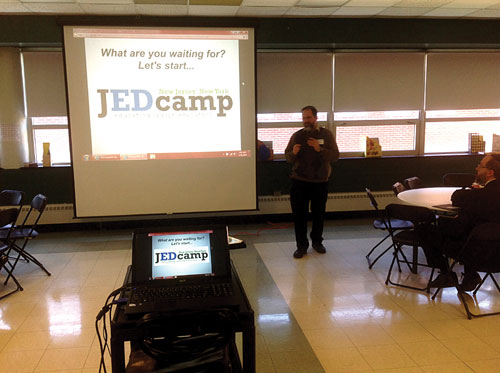.jpg) A group of 75 educators from the tri-state area gathered at Yavneh last weekend for the first annual “JEdCamp” in New Jersey. “JEdCamp” is short for Jewish education camp, an innovative “un-conference” where participants gather in a vendor-free environment and “create” workshops and then lead them. There are no keynote speakers or pre-arranged sessions. People come in, sign in on a whiteboard with their session ideas, and then attend the workshops that interest them most.
A group of 75 educators from the tri-state area gathered at Yavneh last weekend for the first annual “JEdCamp” in New Jersey. “JEdCamp” is short for Jewish education camp, an innovative “un-conference” where participants gather in a vendor-free environment and “create” workshops and then lead them. There are no keynote speakers or pre-arranged sessions. People come in, sign in on a whiteboard with their session ideas, and then attend the workshops that interest them most.
Attendees are encouraged to “vote with their feet,” meaning that if they come to a session and it’s not what they thought it would be, they should feel free to leave and attend another workshop. The free-flowing atmosphere is meant to maximize the learning at the conference by pushing educators to create and find the sessions that are most meaningful to them. The informal JEdCamp atmosphere also lends itself easily to talking shop between sessions, during lunch, and in continuing conversations beyond the event itself.
The idea came from co-founders Rabbis Aaron Ross of Yavneh Academy and Tzvi Pittinsky of The Frisch School, who were inspired by their Twitter professional learning networks (PLNs). Ross and Pittinsky were helped by a committee that included Michael Bitton, Jennifer Bradbury, Yehuda Chaneles, Dov Emerson, Shira Leibowitz, Chani Lichtiger and [full disclosure] this reporter.
Most of the educators who attended the conference were teachers, although administrators, lay leaders, informal educators, and even a high school student took part. Among the topics covered were: the use of positive psychology in the classroom; rhythm and movement in the classroom; iPad implementation in the classroom; standards in Judaic Studies; what high school would look like if we started from scratch; project-based learning; managing time and curriculum needs; forming a PLN; and literacy in the 21st century.
Rabbi Michael Bitton, Educational Technology Director at Magen David, found JEdCamp’s dynamic atmosphere and the connection with his peers energizing. He blogged, “It literally went from ‘Hi, my name is . . .’ to ‘Let’s find time to schmooze sometime next week.’” The session topics were enticing, he wrote: “It was like choosing between T-bone and sirloin steak. You just wanted to attend each one.”
Bitton ended his blog post on “JEdCamp” saying, “I would venture to say that everyone left that building with a sense of accomplishment and [renewed] energy.” While attendees hailed from over 20 different schools, the heavy Bergen Country representation led Rabbi Avraham Bernstein of the Moriah School to note that “The success of JEdCamp speaks volumes about the area’s stellar institutions.”
The experience offered Nancy Edelman, Curriculum Coordinator and English teacher from Torah Academy of Bergen County, new opportunities to engage with her peers. Edelman said, “I didn’t go thinking I was going to present, but when I got there, I felt empowered and thought up a session on the spot: Challenges to Literacy in 2013.” Furthermore, Edelman said, a teacher from Yeshivat Noam, Sara Blum, saw Edelman’s idea and made herself a co-moderator of the session. The two met for the first time right before the session began, talked about their similar concerns, and then led the discussion. The experience, though informal and spontaneous, felt, to Edelman, organic and natural.
Debby Jacoby, who flew in from the California Bay Area for the day, enjoyed practicing collaboration with her East Coast peers, and Seth Dimbert, an educator from Florida who has already organized a JEdCamp there, said, “It was amazing to see such a diverse and insightful group of educators gather on their own time to improve their craft.”
The formula was clearly successful: JEdCamps are currently being planned in both Maryland and Los Angeles, and preliminary talks have begun about the next such “un-conference” in this area.
By Tikvah Weiner











